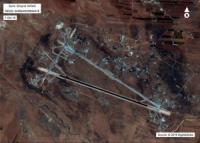-
Why can’t America just take out Assad?

As costly as Western inaction in Syria has been in the six years since the Arab Spring uprisings first took hold in Syria, recent history suggests that removing Assad in a hurry would be an even bigger mistake. Unlike in a game of chess, in war removing the king is not the end, but only another beginning. Targeting Assad would likely give birth to the same kind of catastrophe we saw in Libya after Muammar Gaddafi’s fall. In Libya, with no true civil governance to hold the structure together, tribal alliances collapsed and a four-way fight for power emerged. Assad shouldn’t remain in power – he’s been proving that for six years. The recent Sarin gas attack is only the most recent on a long list of other human rights violations. But he should be part of a political and legal process that removes him. That process must come from the Syrians themselves, not from the outside.
-
-
Bolstering security in urban centers
The terrorist attack in Stockholm on Friday mimicked previous attacks in Europe, in which terrorists used vehicles to kill civilians. Among the cities in which such attacks were carried out are London, Nice, Glasgow, Berlin, and more. More and more cities are considering the use of bollards to protect not only buildings – but other, “softer” urban areas. The Whole Building Design Guide (WBDG) program of the National Institute of Building Sciences offers a detailed Resource Page with useful analysis of and information about crash- and attack-resistant bollards.
-
-
Driver privacy can be compromised in Usage-Based Insurance (UBI) systems
Researchers have demonstrated that it is possible to compromise a driver’s private information stored in the cloud for Usage-Based Insurance (UBI) programs, based on only part of the data collected. UBI programs determine a consumer or fleet insurance premium rate based on several driving parameters that are collected, including total driving time, cornering and average speed. As part of the burgeoning Internet of Things (IoT) connected-device functionality in vehicles, driver data is gradually being stored in the cloud, rather than onboard a vehicle’s computer.
-
-
U.S. strikes Syrian airbase from which Assad forces launched sarin gas attack

The United States has launched fifty-nine Tomahawk cruise missiles on a Syrian airfield from which Syrian military planes three days ago flew to carry out a sarin gas attack against Sunni civilians in the rebel-held Idlib province. More than eighty people, including thirteen children, were killed in the attack – and in a subsequent attack by the Syrian Air Force which destroyed the hospital to which many of the victims of the gas attack were taken. The cruise missiles were launched from the guided-missile destroyers USS Ross and Porter in the eastern Mediterranean. The United States has had military advisers and specialist on the ground in Syria for a while – it now has about 1,000 soldiers in Syria — advising the anti-regime rebels – especially the Syrian Kurds – but last night cruise missile attack marks the first time the United States has been involved as a combatant in the Syrian conflict.
-
-
Will the U.S. missile strike be the turning point in Syria’s shifting war?

The United States has struck the Syrian airbase used to launch a suspected sarin gas attack against Khan Sheikhun that killed more than eighty civilians. The rebel commander whose district was hit by the suspected chemical weapon attack has said he hopes the strike will be a “turning point” in the war — but the long-running conflict has had many such apparently pivotal moments. A shift of U.S. foreign policy on Syria could have been the game-changer. But the U.S. airstrike is more likely to reinforce the balance of power between the combating factions rather than lead to a turning point.
-
-
New technology helps protect biometric databases
More and more people are leaving their fingerprints behind – in passports, when logging in to online banking or their mobile phones. Have you thought about where your fingerprint information is stored and who has access to it? Whether we store fingerprints on our mobile phone chip, with our server host or in the cloud, security is always a concern. Scientists are constantly searching for new and better security solutions to protect your information.
-
-
At least 58 killed in Syrian army’s chemical attack in rebel-held Idlib province

At least fifty-eight people were killed in a chemical attack the Syrian military launched by against a rebel-held Syrian town in Idlib province Tuesday morning. Medics rushed scores of injured civilians to a hospital – but the Syrian air force then bombed the hospital, reducing it to rubble. This is the third reported chemical attack in Syria in just over a week. The previous two were reported in Hama province, in an area not far from Khan Sheikhoun, the site of Tuesday’s attack.
-
-
Online campaigning poses a risk to democracy: Experts
A working group set up by the London School of Economics said that there is a need for an in-depth, independent, research driven, evidence-based review of the role of social media in political campaigning. “There is a real danger that public trust in the democratic process will be lost. There is real potential for foreign influence. We have now the ability to manipulate public opinion on a level we have never seen before. And the current framework is weak and helpless,” said the lead author of an LSE policy brief.
-
-
At least nine killed in St. Petersburg metro bombing
At least nine people have been killed and about fifty more injured when a bomb exploded on a train in St. Petersburg. An explosive device went off at 2:20 p.m. local time on a train leaving the Technology Institute station and heading to the Sennaya Ploshchad station. All train travel in the St. Petersburg area has been suspended, and Russian security services found and defused another explosive device at the Ploschad Vosstaniya station.
-
-
U.K. airports, nuclear power stations on terror alert following “credible” threat
Airports and nuclear power stations in the United Kingdom have been instructed to bolster their defenses against terrorist attacks in the face of intensified threats to electronic security systems. Security services have issued a series of alerts over the weekend, warning that terrorists may have developed ways of bypassing safety checks. U.S. and British security services are concerned that terrorists will use the techniques they developed to bypass screening devices at European and U.S. airports, against other critical infrastructure facilities such as nuclear power stations.
-
-
The tragedy of Mosul: battle against Islamic State is leading to all-too-familiar consequences

A tragedy is unfolding in Mosul, the northern Iraqi city that Islamic State (IS) has brutally occupied since June 2014. The spike in civilian deaths – the result of an intensification of bombing by the international coalition during February and March — has been so dramatic, it has prompted speculation that the U.S. military has changed its rules of engagement. It has also sparked debate about whether deaths caused by the West are held to a different standard than those caused by countries like Russia. The impacts of Mosul’s brutal occupation and painful liberation are compounding Iraq’s seemingly endless list of social and economic problems. The tragedy of Mosul is that while IS’s territorial project in Iraq is coming to an end, it is creating new problems – destruction, displacement, trauma – that exacerbate the country’s existing challenges. The West must acknowledge its role in stoking this crisis, just as Russia and Iran have been responsible for suffering in Syria. Mosul, it seems, is the West’s Aleppo.
-
-
News exposure linked to greater anger toward Muslims: Study
New Zealanders — whether liberal or conservative — show both increased anger and reduced warmth towards Muslims if they are more avid news consumers, a new scientific study has found. “People tend to interpret the news in ways that fit with their pre-existing biases, seeking affirmation of their beliefs while discounting conflicting information,” says one researcher. “New Zealand is a good test for speculation about media-induced Muslim prejudice because of its overall highly tolerant people. If anything, tolerant Kiwis might tend to reject intolerant stereotypes, reducing the effect of the media.”
-
-
Rising flood insurance costs a growing burden to communities, NYC homeowners
Flood insurance is already difficult to afford for many homeowners in New York City, and the situation will only worsen as flood maps are revised to reflect current risk and if the federal government continues to move toward risk-based rates, according to a new study.of-its-kind study by the RAND Corporation.
-
-
Seismic monitoring network helps locate, determine origins of earthquakes in Texas
Almost a decade ago, the ground around the densely populated Dallas-Fort Worth Metroplex started shaking. As the frequency and intensity of earthquakes increased in a region poorly prepared for the seismic activity, the risk became a priority for the state. Residents, politicians, and oil-gas industry leaders reached out to the Bureau of Economic Geology. The bureau is the oldest and second largest research unit at the university, made up of more than 250 scientists, engineers, and economists. The organization also functions as the State Geological Survey of Texas — a broker of information among industry, academia and government agencies.
-
-
Russia, an alleged coup, and Montenegro’s bid for NATO membership
While the investigation into Russian meddling in the U.S. 2016 election continues, Americans should be reminded of the signs of Russian interference in democratic processes outside the United States – specifically, in the Balkans. Montenegro was targeted by an apparent coup attempt during its last parliamentary election on 16 October 2016. Montenegro’s chief special prosecutor has accused two Russian Military Intelligence Service (GRU) agents for attempting to organize the coup. The GRU is the same organization sanctioned by the Obama administration for hacking the Democratic National Committee offices. As some of the plotters later confessed, their goal was to overthrow Montenegro’s government, kill then-Prime Minister Milo Djukanovic and put into power political groups that oppose Montenegro’s NATO membership. Russia’s involvement in Montenegro is a part of Russia’s broader strategy to roll back NATO and EU enlargement while regaining influence in countries that aspire to join those organizations. Russia has proved that it has the capacity to threaten, influence and subvert NATO’s “open door” policy, and there is no reason to believe that the setback in Montenegro will cause Russia to change course.
-
More headlines
The long view
Factories First: Winning the Drone War Before It Starts
Wars are won by factories before they are won on the battlefield,Martin C. Feldmann writes, noting that the United States lacks the manufacturing depth for the coming drone age. Rectifying this situation “will take far more than procurement tweaks,” Feldmann writes. “It demands a national-level, wartime-scale industrial mobilization.”
No Nation Is an Island: The Dangers of Modern U.S. Isolationism
The resurgence of isolationist sentiment in American politics is understandable but misguided. While the desire to refocus on domestic renewal is justified, retreating from the world will not bring the security, prosperity, or sovereignty that its proponents promise. On the contrary, it invites instability, diminishes U.S. influence, and erodes the democratic order the U.S. helped forge.
Fragmented by Design: USAID’s Dismantling and the Future of American Foreign Aid
The Trump administration launched an aggressive restructuring of U.S. foreign aid, effectively dismantling the United States Agency for International Development (USAID). The humanitarian and geopolitical fallout of the demise of USAID includes shuttered clinics, destroyed food aid, and China’s growing influence in the global south. This new era of American soft power will determine how, and whether, the U.S. continues to lead in global development.
Water Wars: A Historic Agreement Between Mexico and US Is Ramping Up Border Tension
As climate change drives rising temperatures and changes in rainfall, Mexico and the US are in the middle of a conflict over water, putting an additional strain on their relationship. Partly due to constant droughts, Mexico has struggled to maintain its water deliveries for much of the last 25 years, deliveries to which it is obligated by a 1944 water-sharing agreement between the two countries.
How Disastrous Was the Trump-Putin Meeting?
In Alaska, Trump got played by Putin. Therefore, Steven Pifer writes, the European leaders and Zelensky have to “diplomatically offer suggestions to walk Trump back from a position that he does not appear to understand would be bad for Ukraine, bad for Europe, and bad for American interests. And they have to do so without setting off an explosion that could disrupt U.S.-Ukrainian and U.S.-European relations—all to the delight of Putin and the Kremlin.”
How Male Grievance Fuels Radicalization and Extremist Violence
Social extremism is evolving in reach and form. While traditional racial supremacy ideologies remain, contemporary movements are now often fueled by something more personal and emotionally resonant: male grievance.
